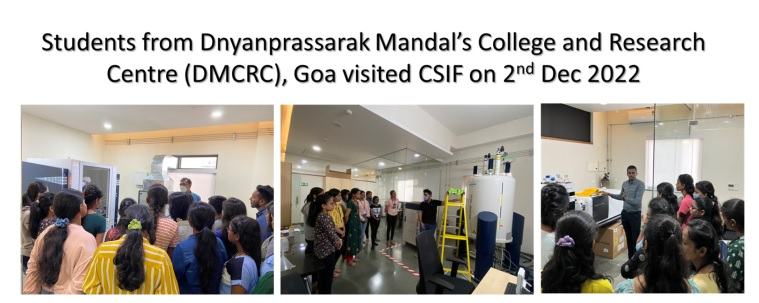Central Sophisticated Instrumentation Facility
Central Sophisticated Instrumentation Facility
Central Sophisticated Instrumentation Facility (CSIF) is the flagship research facility of the BITS Pilani university. BITS Pilani has embarked upon a journey to become a leading research focused university of the world as part of the Vision 2020 program. Thus, to provide impetus to the research efforts of the university as well as to serve the research environment, CSIF was conceived and a dedicated facility with sophisticated infrastructure has been built to house high end instruments. The instruments are in regular use by the faculties of the campus as well as open for analysis for external users. A team of faculty members and dedicated staff takes care of the facility and its operation. The team of CSIF welcomes users and encourages them to utilize the facility for their research.
People
Dr. Kiran Vankayala (In-Charge)
Department of Chemistry, Chamber # A 401/3,
Email: kiranv@goa.bits-pilani.ac.in
Phone: +91 832 2580 238
Dr. Raviprasad Aduri (Nucleus Member)
Department of Biological Sciences, Chamber # C 206,
Email: aduri@goa.bits-pilani.ac.in
Phone: +91 832 2580 394
Dr. Tarun Kumar Jha (Nucleus Member)
Department of Physics, Chamber # D 320/19,
Email: tkjha@goa.bits-pilani.ac.in
Phone: +91 832 2580 177
Facilities
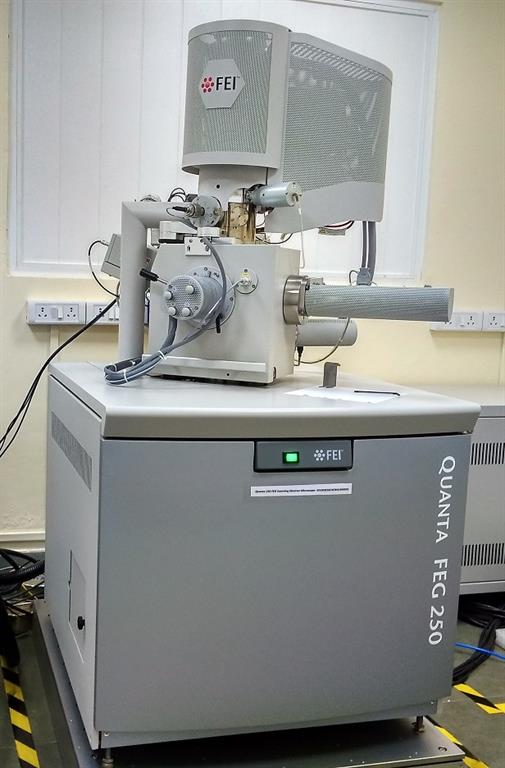
Resolution : 1nm on standard samples (Au nanoparticles on C)
Magnification : Minimum: 100x to Maximum: 3,00,000x (STEM) and 6,00,000x (ETD)
1. Capabilities:
a. High vacuum mode :
i. Everheart Thornley Detector (ETD)
ii. Concentric Backscatter Detector (CBS)
iii. Scanning Transmission Electron Microscopy (STEM) detector
b. Low Vacuum mode & Environmental mode :
i. Large Field Detector (LFD)
2. Energy Dispersive X-ray spectroscopy :
a. Normal Energy Dispersive X-ray Spectrometer (EDS)
b. Mapping:
1. Line mapping
2. Area mapping
Sample Preparation :
1. Sputter coater - LEICA EM ACE 200
2. Critical Point Drying (CPD) - LEICA EM CPD 300
3. Ultra Microtome - LEICA EM UC7
4. Tissue processor - LEICA EM TP
User Charges:

Note:
2. Additional charges for EDX point analysis.
3. Additional charges for EDX Mapping.
4. Additional Charges for STEM Image analysis.
5. Sputter coating charges are applicable only for non-conducting samples.
Sample Requirements for FESEM /STEM
- Sample should be dry & non-magnetic.
- Powder/metal/thin-film samples are accepted for analysis. If powder samples have > 100 nm particle, user is expected to dissolve the same in appropriate solvent and then drop cast/spin coat it on conducting substrate, e.g. Copper, Aluminum foil, silicon substrate before handling for analysis. This can be discussed with the operator.
- Biological & liquid samples should be fixed and coated/drop-casted on a conducting substrates (1cm x 1cm) and dried well before the allotted slot timings.
- Quantity of sample required (Powder samples only): 10 mg (minimum).
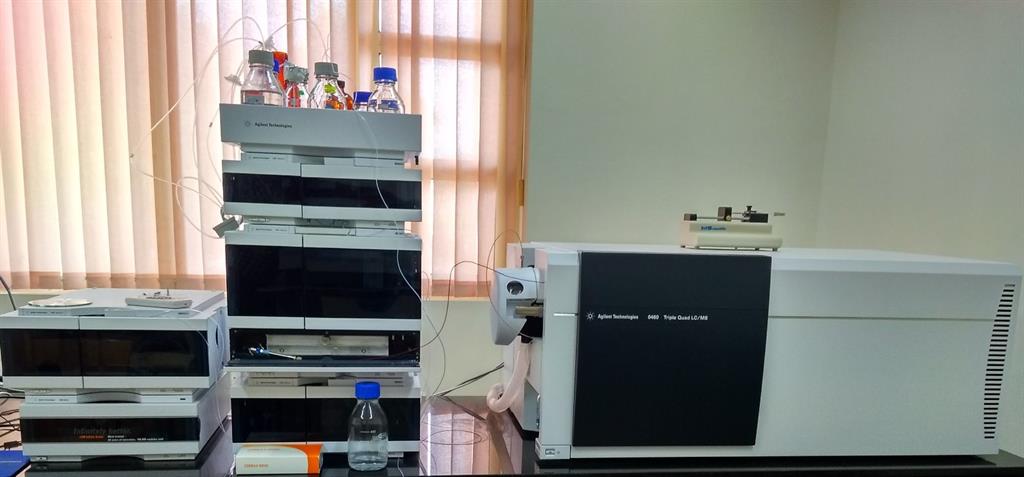
- Agilent Technology
- Model 6460 Triple Quadrupole LC/MS consists 1290 infinity II Binary Pump, auto sampler, and Diode array detector. The supported ion sources are ESI and APCI.
- Femtogram-level of detection and quantitation.
Application for :
- Food safety studies
- Environmental studies
- Drug discovery
- Forensic
- Bioanalysis
- Protein
- Academia
- Clinical
- Pharmaceutical
- Veterinary drug
User Charges:

Note:
1. Solvents like DMSO, DMF and THF cannot be used. The integrity of sample to be injected into the instrument will be at the sole discretion of the operator. It is the responsibility of the user to discuss the same with the operator prior to analysis. Impure and crude samples are unlikely to be analyzed.
2. All samples will be discarded after use. In case the user wishes to retain his or her sample after analysis, this may be informed to the operator prior to analysis.
3. ESI /APCI-MS and LC-MS/MS are possible only in methanol, acetonitrile or water.
4. 5-10 mg sample, LC conditions & LC trace for LC-MS and LC-MS/MS is required.
5. MS-DS (Material Safety Data Sheet) of the sample must be provided with analysis request.
Allotment of slots will be at the discretion of the operator after discussions with the user. Any special analysis request (not included in the above list) may be discussed with the operator for feasibility and will be charged accordingly after discussions with in the In-Charge, CSIF facility, BITS Pilani K K Birla Goa Campus.
Equipment details:
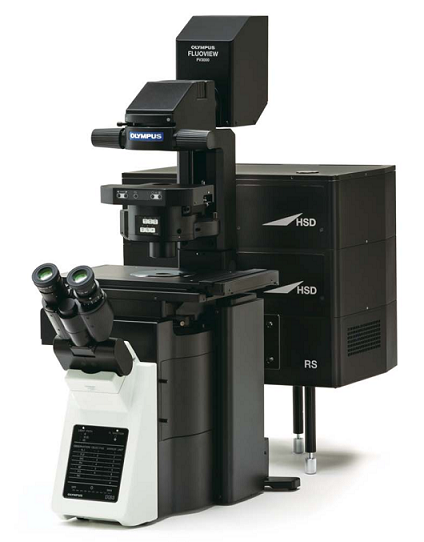
*Model : Olympus Corporation FV3000
* Double deck Motorized Frame with Motorized sextuple revolving nosepiece
* Diode lasers: 405, 488, 561, 514 & 640 nm
* Infinity corrected objectives 1.25X, 10X, 20X, 40X, 60X & 100X.
* Live tissue and cell samples in CO2 incubator.
* Stroke: 10.5mm, Minimum increment: step size of 0.01μm,
* SMART Touch Panel Controller Switch
* Automatic controls for switching of optical Components, aperture adjustment and exposure.
User Charges

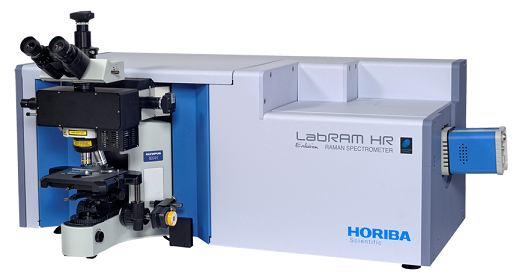
LAB RAM HR Horiba France
· Spectral Range 200 - 2100 nm
· Microscope with three objective; 5x, 10x, and 100x.
· Spectrometer with two gratings: 600 and 1800 gr/mm.
· Available Lasers:
(A) 325 nm He-Cd laser 25 mW
(B) 532 nm Nd-YAG laser 100 mW
(C) 633 nm HeNe laser 17 mW and
(D) 785 nm diode laser 100 mW.
· Spectral searching and analysis software (KnowItAll Horiba Edition)
· Motorised x-y stage
· Three positions - 100 % Transmission, 100 % Reflectance, 50 % Transmission
· Lateral Resolution ~ 5 μm
User Charges:

Equipment details:
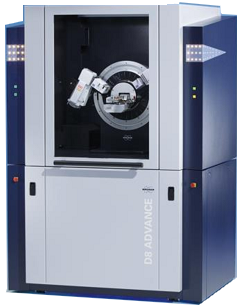
Bruker D8 Advance
* Micro-structure & crystal structure analysis
* Powder diffraction applications
* Quantitative phase analysis
* Low angle diffraction
* High temperature (up to 1600 C) attachment
User Charges:

Equipment details:
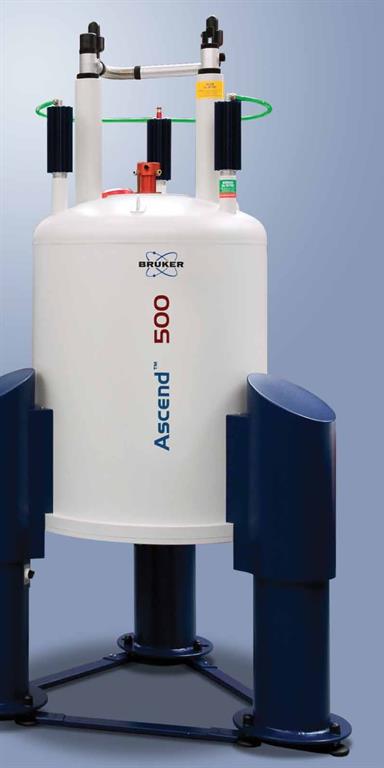
- Bruker Avance Neo 500 MHz
- Liquid and Solid state NMR
- RT Probe plateform, TopSpin controlled console
- Gradient control with a resolution of 12.5 ns
User Charges:
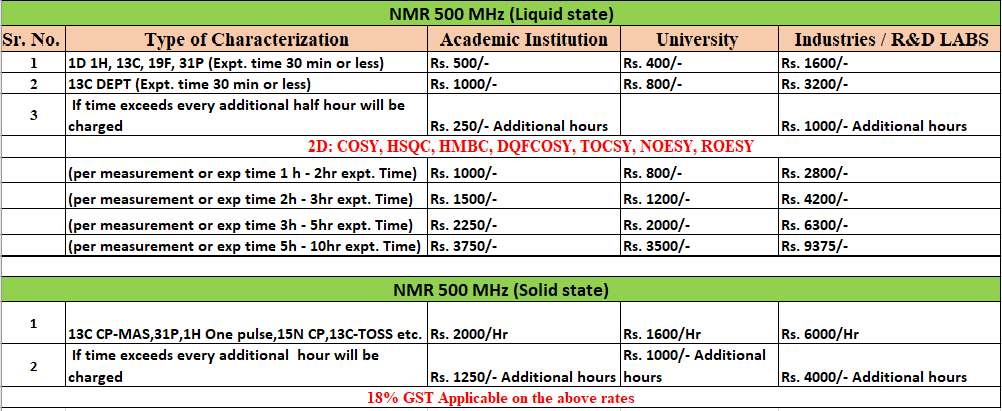
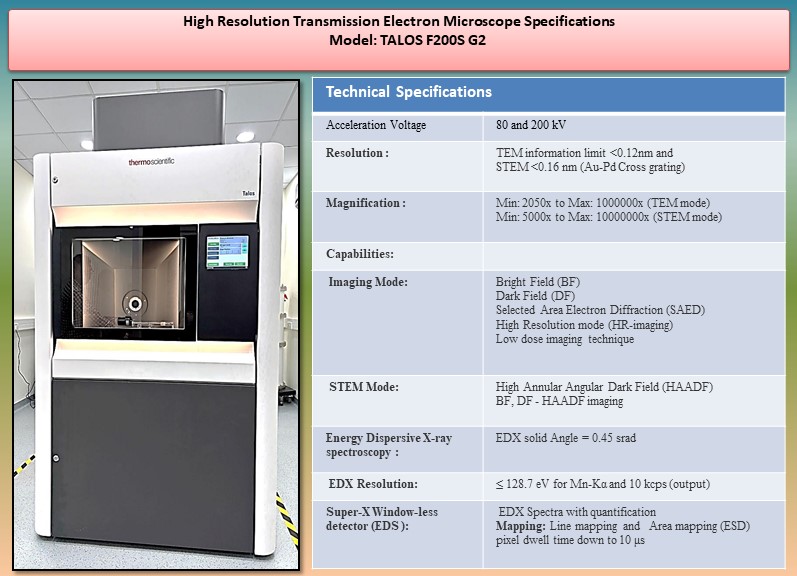
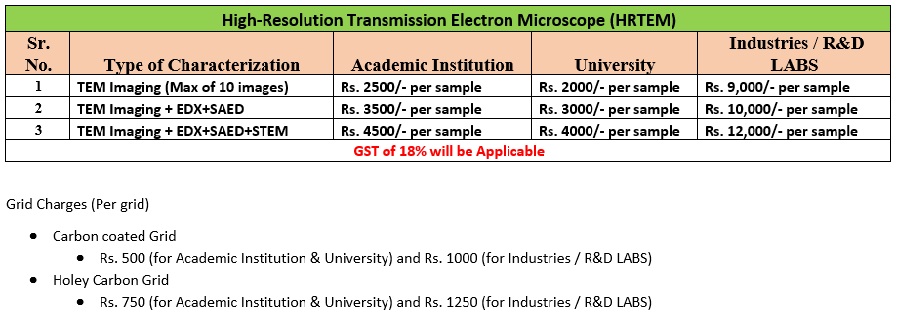
Equipment details:
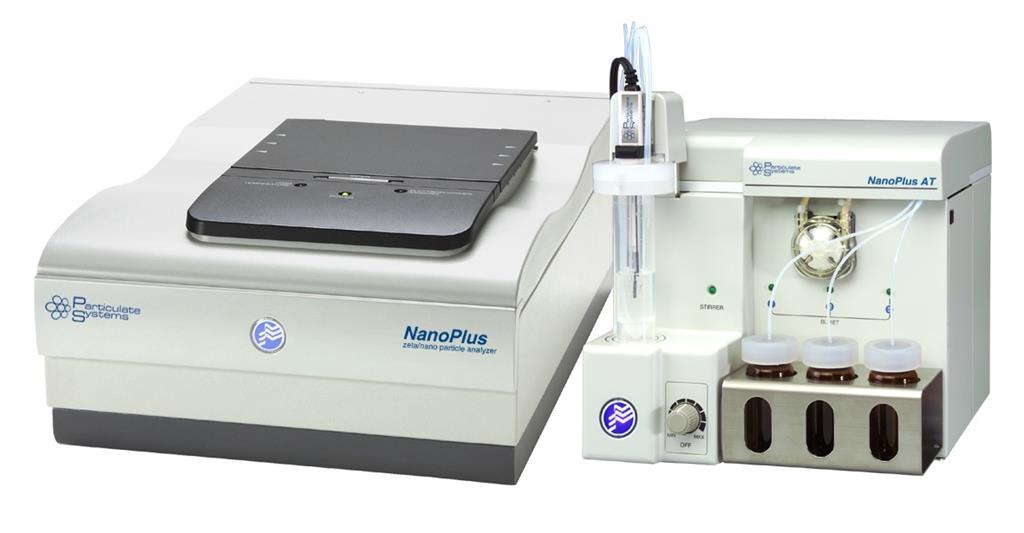
* Particle sizing by Dynamic Light Scattering
*Zeta potential determination of Particles/powder dispersed in suitable liquid Thin membrane by electrophoretic Light Scattering
User Charges:

CSIF Policies
CSIF has one faculty in-charge (FIC_CSIF) and nucleus members appointed by the Director. FIC_CSIF and nucleus members would be running the facility with the help of technical staff at CSIF.
Centre hosts following two types of equipment:
- CSIF Equipment: Mainly used by research scholars, faculties and external users on payment basis.
- IMA Equipment: Mainly used by FD students in their lab courses.
FESEM, LCMS, Raman, Confocal microscope, XRD etc.
XRD, UV Spectrometer, TGA etc.
CSIF equipment operations
- Each equipment would be having one equipment faculty in-charge (EFIC), Staff in-charge (SIC, operational owner of the equipment), 2nd staff in-charge (SIC2, when SIC is absent SIC2 will take the ownership).
- Operational decisions would be mainly taken by SIC. Users will be following the instructions of the SIC. In the lab, SIC’s decision would be final and binding to every user.
- Equipment will be operated by the staffs only.
- CSIF staff will maintain a strict No Exception policy. Rules and regulations will be uniform for everyone and every equipment under CSIF facility.
Equipment slot booking
At present, slot booking would be done manually with respective SIC. In due course of time CSIF will make it online.
Usage charge rate
Usage rates are going to be fixed every financial year.
Grievances redressal mechanism
Grievances, suggestions, and feedback will be collected online. Team would discuss the matter and take collective decisions. CSIF will not be able to follow verbal communications.
Acknowledgement to CSIF
Acknowledgment of the BITS Pilani Goa CSIF facility is encouraged by the CSIF team with following lines:
“____ acknowledges the Central Sophisticated Instrumentation Facility (CSIF), BITS Pilani KK Birla Goa Campus.”We request all users to submit the publication details to the CSIF data base.
Training and outreach
- CSIF will organize familiarization program at the beginning of every semester for new Ph D students and interested faculties who will be using the facility.
- Centre encourages the lab course in-charges to make demonstration videos of the equipment at the centre. By making videos the instructors can emphasise various scientific aspects of the equipment and students can view as per their convenience. Centre discourages the demonstration tours of the classes for logistic reasons.
- The analytical data provided will be for R&D purposes and will not be utilized for any legal disputes in any form whatsoever.
- It is the responsibility of the user to coordinate with the operator prior to analysis and ensure that all relevant information related to the sample is provided. It is expected that the user will meet and discuss as per a time convenient to the operator to ensure that the analysis of on-going samples is not hampered.
- Multiple samples may be provided separately and will be charged as per the Charge list. The samples must be numbered accordingly and the user must ensure the same.
- The CSIF facility or operator will not be responsible for sample integrity. The decision of the operator prior to analysis is binding.
- Users are expected to be responsible and not abuse / shout at the operator. In case of any discrepancy or dispute with the operator, users may contact Faculty in-charge (fic.csif@goa.bits-pilani.ac.in) to clear the same prior to analysis.
- No change in sample analysis or procedure will be allowed once the process after payment has been initiated, unless the analysis demands it. This is at the discretion of the operator.
- UIN must be mentioned in all correspondence associated with respective analysis.
- Radioactive material, unstable and explosive compounds must be reported. Even then, for safety reasons such samples may not be accepted for analysis.
- It is expected that the users will revert with information on how the results of the analysis has been used (for e.g. paper publications, thesis etc.).
- In case the user wants his or her sample back, the same may be communicated to the operator prior to start of the analysis. The same should be taken along with the analysis report. Samples not collected within 3 days of collection of report will be disposed without any notice to the user.
- The user is solely responsible for numbering of his samples and this again should be after discussion with the operator.
- All preparation of samples as appropriate must be done at the user’s end prior to characterization. This may be discussed with the operator as deemed necessary.
- The user must ensure that he or she reports on time as per the slot provided by the operator. In case of delay, no extension to the slot duration will be provided. In case of a possible no-show, the user may inform the operator in advance so that an alternate slot can be provided.
- The user may not allow for a substitute to be present during sample analysis. The user may also not bring more than 1 additional person to the facility during analysis.
- Additional charges wherever appropriate may be levied for any special analysis request not included in the Charges list for respective equipment.
- The user is responsible to ensure that wherever appropriate SRCD, ARD and Department HOD are communicated with regard to any usage of funds from Sponsored projects, PI / Department Development fund or from PhD Contingency fund. CSIF will not be responsible should any discrepancy arise.
- The charge list and policy will be reviewed periodically and changes if any will be duly informed to all users by CSIF. Any suggestion or errors in this document may be brought to the notice of the Faculty in-charge (fic.csif@goa.bits-pilani.ac.in).
- It is proposed within the next few months to make the process online for ease of operation. Users are expected to co-operate till this facility is set up.
- No cash or cheque payment will be accepted. I-Collect payment is preferred. DD will be accepted.
- All forms are templates only and may be extended accordingly if needed to suit the information to be incorporated by the user.
Bookings
*Users from University/ Institutions within the state of Goa may contact us for special pricing
Workshop
Outreach Activities

